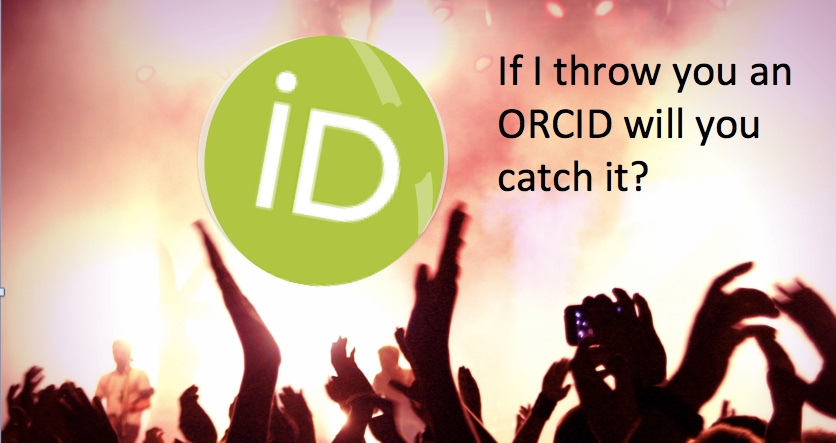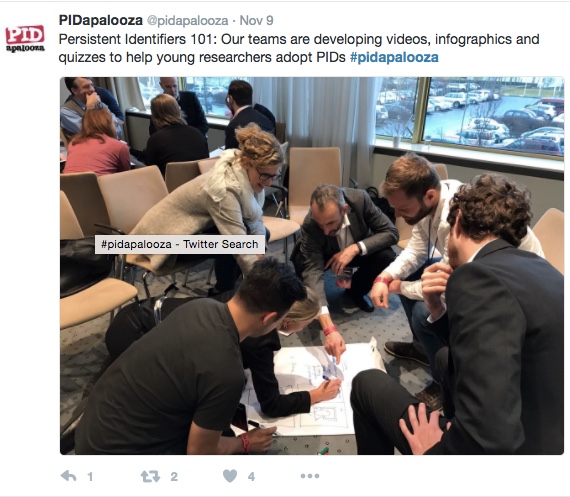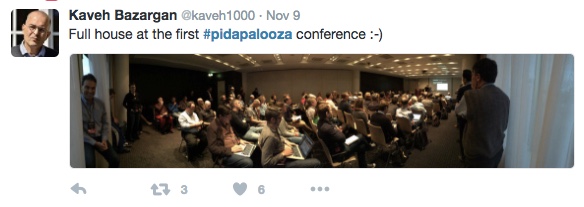 In many ways, these closing words to Simon Porter’s plenary session at PIDapalooza 2016 captured both the spirit and the underlying theme of this first-ever event: playful, yet purposeful.
In many ways, these closing words to Simon Porter’s plenary session at PIDapalooza 2016 captured both the spirit and the underlying theme of this first-ever event: playful, yet purposeful.
The impetus behind PIDapalooza, which took place on November 9-10 in Reykjavik, Iceland, was the need for collaboration between the parties that develop, maintain, and use persistent identifiers (PIDs). This in turn is being driven by an increasing recognition for the importance of PIDs in digital research infrastructures. And it was also – despite the geek factor that goes with gathering 120 or so people from around the world to talk persistent identifiers – a lot of fun!
Carly Strasser’s (Gordon and Betty Moore Foundation) wrap-up plenary epitomized the vibe with a combination of tributes to classic Lollapalooza acts – from the Ramones to Jane’s Addiction – and a thoughtful summary of key conference themes, official and unofficial. For these, she picked out granularity, our “addiction” to identifying things, learning, user outreach, interoperability, ideal versus reality, and responsibilities.
To Carly’s point about our addiction to identifying things, several sessions focused on different types of persistent identifier, whether already in use or yet to be developed, such as IDs for projects, protocols, and equipment. This generated some energetic conversations – after all, just because something can have an identifier doesn’t necessarily mean it should… Plenary speaker Jonathan Clark of the International DOI Foundation had some useful thoughts on this topic, and concluded that actually the main challenge to identifier adoption and use is social not technical.
Variations on this theme – which fall under Carly’s topics of user outreach and learning – cropped up again and again throughout the meeting. Developing a strong and consistent message about the value of  persistent identifiers, and getting that message out – to research institutions, funders, publishers, associations, and other research organizations, and above all to researchers themselves – is a big challenge for us all. Crossref, DataCite, and ORCID collaborated to run a curriculum session, out of which we plan to create a suite of resources for researchers. Other sessions looked at ways to engage with researchers, encourage adoption and use of identifiers, and build a community of practice.
persistent identifiers, and getting that message out – to research institutions, funders, publishers, associations, and other research organizations, and above all to researchers themselves – is a big challenge for us all. Crossref, DataCite, and ORCID collaborated to run a curriculum session, out of which we plan to create a suite of resources for researchers. Other sessions looked at ways to engage with researchers, encourage adoption and use of identifiers, and build a community of practice.
In Simon Porter’s (Digital Science) talk on research information citizenship, he urged us to recognize the parts we each play in how we develop, maintain, and use PIDs and – critically – how we engage with each other and with our researcher communities. This also chimes well with ORCID’s Collect & Connect program, which is intended to clarify individual and sector responsibilities with regard to ORCID implementation and use.
Another plenary speaker, Clifford Tatum, argued that identifier portability is every bit as important as interoperability – in particular as a way of addressing what he called the “interoperability dilemma”. This, he described as a tension between the desire for open science and the need to balance this with privacy, security, and commercial concerns for some data, such as those gathered from human subjects including faculty, staff, and students. Identifier standards and protocols can help to ensure privacy is respected, data provenance is clear, and interoperability between systems is enabled. Meanwhile, Herbert van de Sompel pointed out that PIDs need to be actually used in order to achieve their intended persistence. This makes the lack of working identifiers – for example due to reference rot – a major problem. His proposed solution is a signposting pattern for PIDs.
Despite – or perhaps because of! – being the penultimate session of the meeting, the hour-long discussion of organization identifiers surfaced a variety of views on the topic. ORCID, together with Crossref and DataCite, is convening a community working group to develop recommendations for establishing a robust, sustainable, community governed, open organizational identifier system. As previously announced on the ORCID blog, feedback to the working documents closed on November 21, but we will keep you updated on progress and welcome your input and comments.
There were many more great sessions at PIDapalooza on topics as diverse as measuring PID adoption, ethics, and data sharing. While we can’t cover them all here, we encourage you to take a look at the presentations, which are freely available on Figshare.
 Although not explicitly called out as a theme – official or otherwise – collaboration underpinned PIDapalooza. The event provided an opportunity to hash through a lot of questions and start discussions about practical options. The weather may have been gloomy and the beer expensive, but the conversations were meaty, the food was excellent and, when asked if we should do it again next year, all hands were raised. So let’s see how much progress we can make before PIDapalooza 2017!
Although not explicitly called out as a theme – official or otherwise – collaboration underpinned PIDapalooza. The event provided an opportunity to hash through a lot of questions and start discussions about practical options. The weather may have been gloomy and the beer expensive, but the conversations were meaty, the food was excellent and, when asked if we should do it again next year, all hands were raised. So let’s see how much progress we can make before PIDapalooza 2017!
